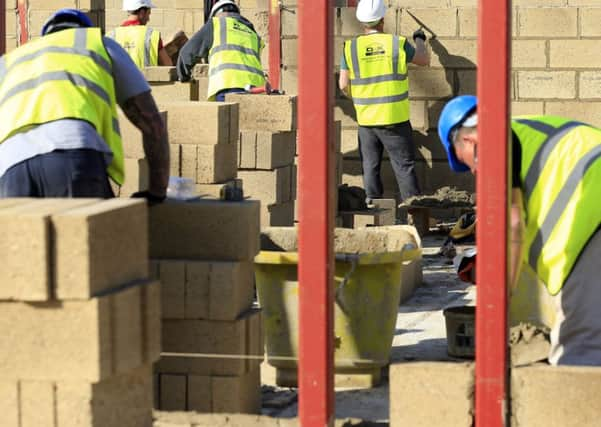Sector's downturn raises the risk of recession


The UK’s construction industry saw its fastest fall since June 2009 as the sector came under pressure from economic uncertainty sparked by Britain’s vote to leave the European Union.
The closely-watched Markit/CIPS construction purchasing managers’ index (PMI) was 45.9 in July, down slightly from 46 in June but above economists’ expectations of 44.
Advertisement
Hide AdAdvertisement
Hide AdA reading above 50 indicates growth. The report said the drop was driven by the steepest fall in the commercial building sector for more than six-and-a-half years, while civil engineering activity also tumbled for the first time in 2016.
But it added that new orders had fallen at a slower pace in July than the month before, indicating some resilience from the sector despite concerns over the Brexit vote.
Concerns about an imminent slowdown in the UK economy were underscored on Monday when the PMI for Britain’s manufacturing industry showed the sector had slumped to its lowest level for more than three years, hitting 48.2 in July, down from 52.4 the month before, as it counted the cost of Britain’s decision to ditch the EU.
The string of reports pointing to a lacklustre performance from the UK economy has sharpened the focus on Thursday’s interest rate announcement, with many economists expecting the Bank of England to cut the cost of borrowing and increase quantitative easing in a bid to shore up economic growth.
Advertisement
Hide AdAdvertisement
Hide AdTim Moore, senior economist at Markit, said: “July’s survey is the first construction PMI compiled entirely after the EU referendum result and the figures confirm a clear loss of momentum since the second quarter of 2016, led by a steep and accelerated decline in commercial building.
“Reduced volumes of new work to replace completed projects contributed to a fall in employment for the first time in just over three years.
“UK construction firms frequently cited ongoing economic uncertainty as having a material negative impact on their order books. In particular, survey respondents noted heightened risk aversion and lower investment spending among clients, notwithstanding a greater number of speculative inquiries in anticipation of lower charges.”
However, he said construction firms were seeing clients adopt a “wait and see approach” in July rather than cancelling upcoming projects altogether. The report said that despite the uncertain business outlook for the sector, overall demand was resilient for housebuilding and infrastructure projects last month.
Advertisement
Hide AdAdvertisement
Hide AdIt added that the number of people working in the industry had dropped for the first time since May 2013, as there was not enough new work to replace finished projects.
David Noble, group chief executive officer at the Chartered Institute of Procurement & Supply (CIPS), said: “Though a marginal drop in the index compared to last month, the sector’s downhill course is a seriously disappointing development, with purchasing activity falling for the second consecutive month.”
Overall, there was little in the construction PMI to challenge expectations that the Bank of England will cut interest rates on Thursday to a new record low and possibly revive its bond buying programme.
“UK construction has been one of the hardest hit sectors following the Brexit result,” said Julie Palmer, partner at consultancy Begbies Traynor.
“The rise in uncertainty will have led to a steep slowdown in investment activity and so, in the short term at least, UK construction will feel some pain.”